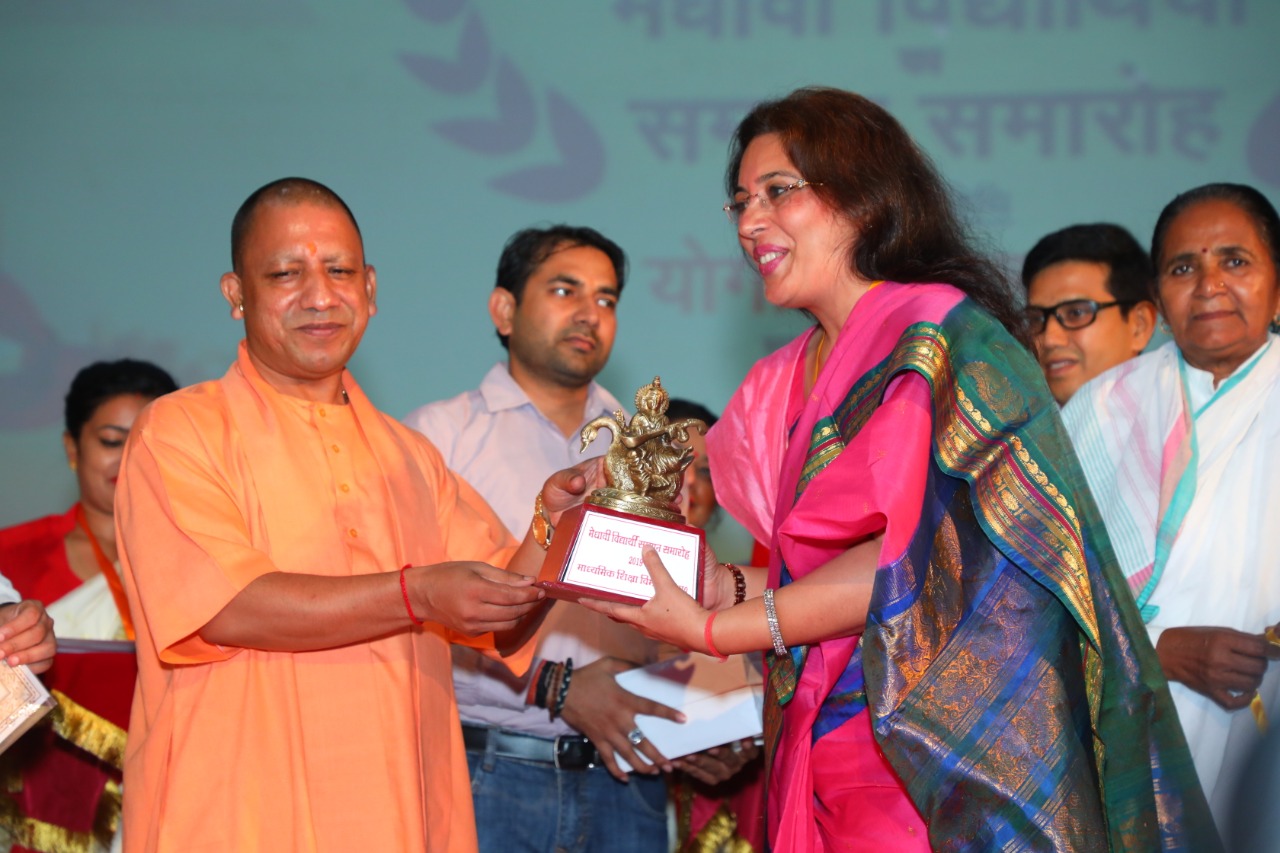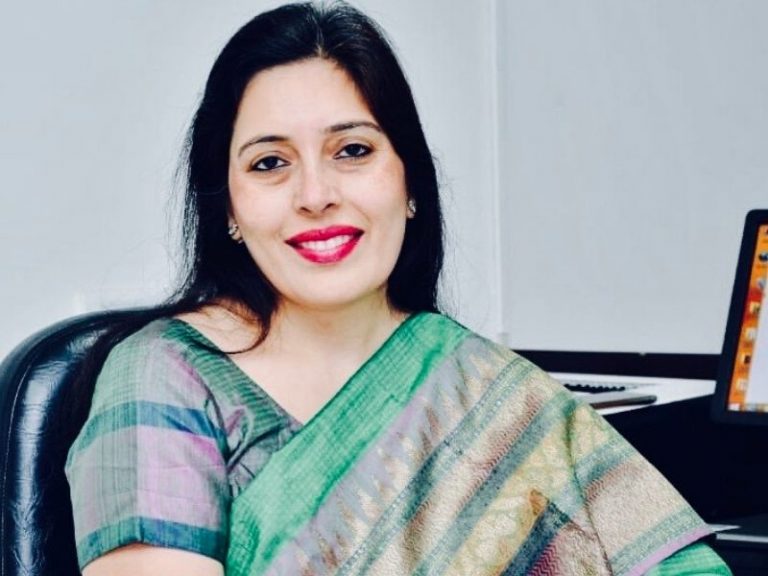Eduleader Focus: Dr Jyoti Gupta, Director-Principal, KR Mangalam World School
 EducationWorld has introduced a new series, the ‘Eduleader Focus’ featuring interviews with principals of reputed educational institutions who are popular among their students and staff. In this edition of ‘Eduleader Focus‘, Dr. Jyoti Gupta, director-principal, KR Mangalam World School, Greater Kailash II (Delhi) in conversation with EducationWorld, discusses the current state of education in India, about teacher welfare and her interests.
EducationWorld has introduced a new series, the ‘Eduleader Focus’ featuring interviews with principals of reputed educational institutions who are popular among their students and staff. In this edition of ‘Eduleader Focus‘, Dr. Jyoti Gupta, director-principal, KR Mangalam World School, Greater Kailash II (Delhi) in conversation with EducationWorld, discusses the current state of education in India, about teacher welfare and her interests.
An economics alumna of Delhi and Meerut universities, Dr. Gupta started her career in 1988 as a teacher in DAV Sahibabad followed by DPS, RK Puram and DPS, Vasant Kunj. In 2005 she was appointed principal of DPS Sushant Lok, Gurgaon and subsequently in 2011 as principal of Delhi Public School, Ghaziabad (DPSG). In 2018, Dr. Gupta masterminded the establishment of DPS Sahibabad. Presently, she helms an educational institution with 2,500 students as its director-principal.
Schools have been shut for the past two years. What are the challenges that the school community is likely to face once they reopen?
The return to school is an important and hopefully a welcome step. The various challenges that the school community is likely to face once they reopen are:
-
Supporting the mental health of students
-
Providing extra support to students to catch up on their learning
-
Implementing blended learning models
-
Supporting children who are facing specific challenges such as grief due to a loss in the family or heightened anxiety due to the pandemic
-
Guiding children who are struggling to get back into the ‘school mode’
-
Providing opportunities to students for physical activities/sports and combating stigma against students who have been sick.
What are the challenges of online teaching and how far has your school been able to deal with these challenges?
Education has changed dramatically with the advent of e-learning. The various challenges of online teaching are:
• Attention: One of the biggest challenges of teaching online is ‘attention’. Children are at liberty to mute their mikes while attending online classes and some children are also prone to get up and wander away from their class. Also at home, they easily get distracted.
• Lack of IT support: Lack of IT support, continuous technological changes, unequal access for all students, unoptimised software for mobile devices and security issues.
• Lack of cooperation from parents: Parents tend to come in between the classes and start talking to students.
Other challenges include effects on the psychomotor domain, lack of discipline, regularity, social interaction and real-world experience.
The absence of physical interaction has taken a toll on the emotional health of children. What steps has your school taken to ensure the mental well-being of its students?
Our school’s mental health professionals (eg. counselors, school psychologists) used scores on carefully designed questionnaires to identify students who are at risk for anxiety or depression. Sometimes, the at-risk students are asked to complete the questionnaire again a few weeks later to determine whether their mental/emotional issues still persist. Typically, the at-risk students are referred to the school counselor. Teachers are also asked to nominate students who appear highly anxious or frequently sad.

If not a teacher, you would be…
A philanthropist who would be contributing to social and national development.
What is your philosophy of education?
In order to thrive in a rapidly evolving and increasingly globalised world, students need to be creative problem-solvers, lifelong learners and effective communicators. They must also be technology savvy, excellent team players and responsible and engaged citizens. My goal as an educator is to help my students grow academically, morally, and socially. By respecting the differences of each student’s personality and learning styles, I enable each student to become a life-long learner and an active citizen of the country.
Describe your leadership style.
I believe in developing the skills of teachers because the ultimate goal is to enable the students to succeed. I consider the individual needs of students and utilise positive influence and inspiration to ensure that they remain committed to their studies. I stay in constant touch with my school staff members and involve them in brainstorming ideas for solutions to any concerns that arise.
What do you do to unwind/destress yourself?
I take a walk, meditate or do yoga.
If there was one thing you could change in India’s education system, what would it be?
Being educated and being literate are two different things. A student who has just passed class 12 is considered literate but not educated. Education is about gaining practical knowledge. The Covid pandemic has made it more difficult for the institutions to provide practical hands-on learning, as most online classes are focused just on theory.
Career counseling is absent in most schools and students are not aware of their strengths and the scope for doing something out of the box. Every student by the age of 12 should know his/her educational options. Considering one particular stream superior to the other stream should be discouraged.
Can you give us an estimate of the learning loss children might have faced during the pandemic? How according to you can we make up for the learning loss?
In India, nine of every 10 children between grades 2-6 have lost at least one language ability, and eight of every 10 have lost at least one Math ability from the previous year. Nearly 75 percent of parents of children between 5-13 years, with access to digital devices, report that their children have been learning less in comparison to the physical classroom setting. Various ways to make up for the learning loss are:
-
Build relationships
-
Teach vocabulary explicitly
-
Get your students engaged and excited.
-
Don’t be afraid to be vulnerable
Teachers have been under tremendous stress because of hybrid learning, unprecedented lockdowns, completion of syllabus, etc. As a leader, how have you helped them deal with it?
As a leader, I ensured our teachers’ jobs and salaries were not impacted so that there is a motivated workforce ready to get students back to speed when schools reopen. We provided teachers with professional development support to undertake effective remedial education. They were also offered sessions on mindfulness, yoga, exercise, and healthy eating.
How satisfied are you with the growth and development of your school?
Our classroom programmes are rich and engaging and allow every student access to an environment where they can participate and excel. Our excellent results in CBSE board exams are a testimony to the excellence of the teaching staff who strive to create a challenging learning environment. I take great pride in its achievement as we move ‘Together Towards Tomorrow’ to conquer new shores.
Also Read: Eduleader Focus: Siddharth Rajgarhia, DPS, Nashik, Varanasi, Lava Nagpur
















Add comment